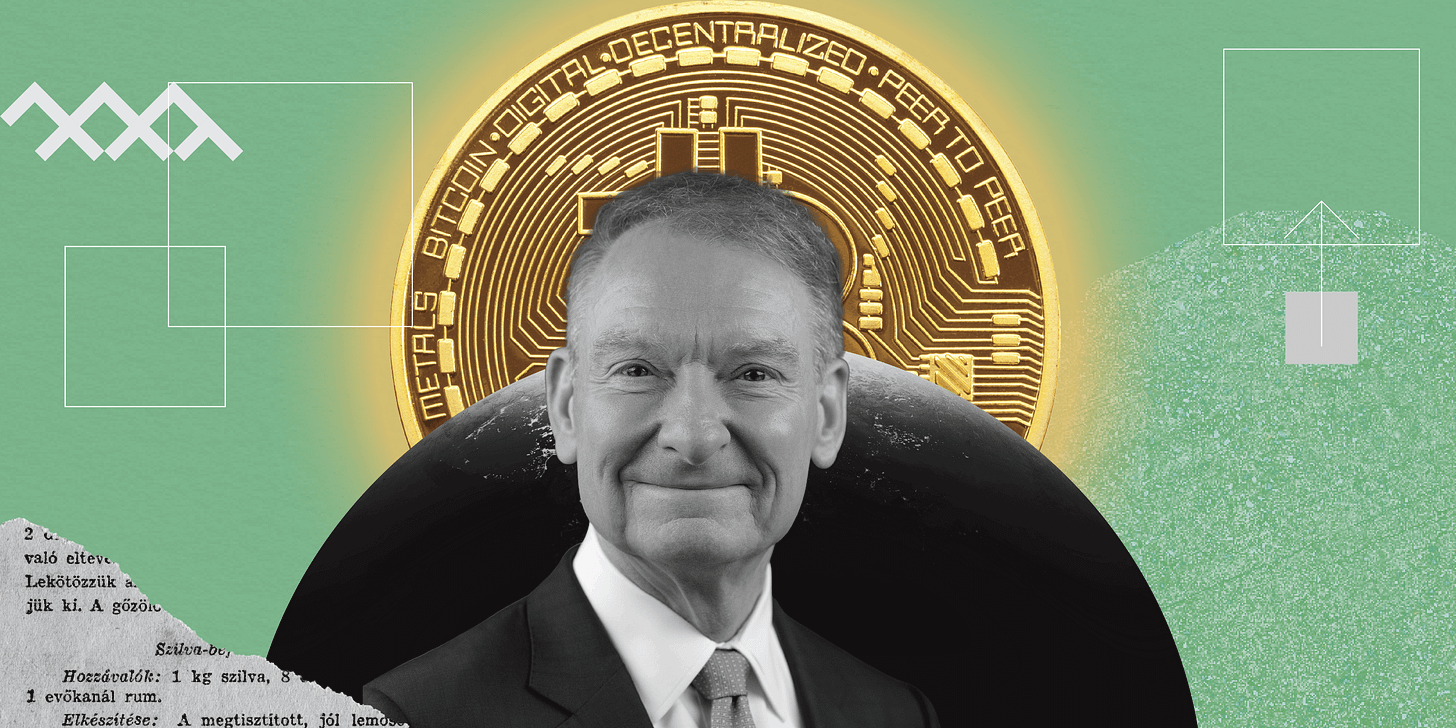"Crypto's Time Has Come"
In a recent address, SEC Chairman Paul Atkins signaled that "crypto’s time has come."
The Crypto Advisor is your trusted resource for navigating the world of cryptocurrency. Each week, we deliver a clear and concise update on the latest developments in crypto, straight to your inbox. This is more than just a newsletter; it’s an essential resource for forward-thinking advisors focused on maintaining a competitive edge. We’re excited to support your journey in adapting to and thriving in the new age of financial services.
"Crypto's Time Has Come"
When the Chairman of the SEC declares, “Crypto’s time has come,” it reverberates across the financial world. Few statements carry more weight than those from the head of the planet’s most powerful securities regulator. These words aren’t just commentary – they signal that the era of digital assets has arrived and can no longer be ignored.
Paul Atkins made this statement during his keynote at the inaugural OECD Roundtable on Global Financial Markets, which brought together more than 130 delegates from over 45 countries, including senior officials from ministries of finance, central banks, and regulators. Seeing the top U.S. securities regulator openly acknowledge crypto’s importance was a rare moment – not just another speech, but a clear signal that digital assets are now part of the conversation at the highest levels.
For Atkins, the speech – both in content and context – was what he described as “a homecoming of sorts.” Drawing on decades of international regulatory experience, he reflected:
“In the late 1980s, I was a young lawyer in the Paris office of a New York law firm, learning as much about the intricacies of international finance as the enduring value of cooperation across cultures. In the decades since, multiple tours of duty at the SEC have further underscored to me how the principles we prize in the United States – among them the might of free enterprise and the vigor of capital markets – can find common cause abroad. And it is in that spirit that I welcome today’s discussion on fueling growth and opportunity across our domestic economies.”
Crypto, in many ways, is part of that homecoming. After years on the sidelines, digital assets are now entering the mainstream – not as a fringe experiment, but as a legitimate piece of the global conversation about growth, markets, and opportunity. This moment will only endure if regulators and industry leaders seize it, and Atkins made clear he intends to.
He underscored the point directly:
“As we call on our partners to foster investor confidence and dynamic markets in their jurisdictions, these same priorities compel us, in the United States, to unleash the potential of digital assets in ours.”
The message is unmistakable: the U.S. must lead by example, building rules that both protect investors and unlock innovation.
Atkins also tied his remarks to personal history:
“As I referenced earlier today, in the late 1980s I worked about four kilometers from where we are convening now—on the Place de la Concorde. At the time, I could hardly have imagined returning in my current role to speak of new technologies, including those that once were dismissed or resisted outright, yet are now revolutionizing global finance. It seems only fitting, here just steps from Avenue Victor Hugo, to summon his words to our moment, ‘on résiste à l'invasion des armées; on ne résiste pas à l'invasion des idées’—an invasion of armies can be resisted, but not an idea whose time has come. And today, ladies and gentlemen, we must admit that: crypto’s time has come.”
No interpretation is needed. The SEC Chairman is saying plainly: crypto is a global, unstoppable idea, and its moment has arrived.
Atkins continued:
“For too long, the SEC has weaponized its investigatory, subpoena, and enforcement authorities to subvert the crypto industry. That approach was not only ineffective, but injurious; it drove jobs, innovation, and capital overseas. American entrepreneurs bore the brunt—and were forced to spend fortunes building a legal defense instead of a business. That chapter belongs to history.”
This line struck a chord: entrepreneurs spending fortunes on defense instead of innovation – a chapter Atkins insists is over.
“It is a new day at the SEC. Policy will no longer be set by ad hoc enforcement actions. We will provide clear, predictable rules of the road so that innovators can thrive in the United States. President Trump has tasked me and my counterparts across the Administration with making America the crypto capital of the world—and the President’s Working Group on Digital Asset Markets has delivered a bold blueprint to guide us in these efforts.”
Never before have U.S. regulators been so focused on elevating crypto rather than suppressing it. That shift is one reason cycle theory is losing relevance. Being anti-crypto is no longer fashionable. With clearer guidance and a stronger emphasis on innovation, the old patterns of fear and uncertainty carry far less weight.
In the rest of his address, Atkins outlined a vision of modernization and clarity. Through Project Crypto, outdated rules will be rewritten to move markets on-chain, define which tokens are securities, and give entrepreneurs the certainty they need to raise capital. The vision includes “super-app” platforms where trading, lending, and staking coexist under a single regulatory framework, and multiple custody solutions for investors, advisors, and broker-dealers.
The broader aim is minimal, effective regulation – protecting investors without stifling startups – so American companies can compete globally. Competition in products and venues, not excessive red tape, is what will drive the U.S. crypto industry forward.
Atkins closed with this thought:
“President Trump calls America a ‘nation of builders.’ Under my chairmanship, the SEC will encourage those builders, not suffocate them under red tape. Our goal is simple: to spark a golden age of financial innovation on U.S. soil. Whether through tokenized stock ledgers or entirely new asset classes, we want breakthroughs to be made in America’s markets, under American oversight, for the benefit of American investors.”
The message is clear: crypto isn’t just tolerated in the U.S. – it’s being welcomed as a central pillar of the financial system. The SEC isn’t merely allowing innovation, it’s creating the frameworks for it to thrive.
Each week strengthens our conviction: for advisors, finding a way to be involved in this asset class is no longer optional. Other opportunities may remain attractive, but none will move as fast or carry the same potential to reshape the financial landscape.
Cboe to Launch Long-Dated Bitcoin and Ether Futures, Simplifying Crypto Exposure for U.S. Investors
Cboe Global Markets has announced plans to launch continuous Bitcoin and Ether futures on November 10, pending regulatory approval. Unlike traditional futures, these contracts are designed to run for up to 10 years, reducing the need for frequent rolling and simplifying position management. They will be cash-settled and linked to real-time spot prices through a transparent, replicable funding rate methodology.
Perpetual-style futures have long been popular in offshore markets, and Cboe’s offering will bring similar functionality to a U.S.-regulated exchange. The contracts will clear through Cboe Clear U.S., a CFTC-regulated clearinghouse, providing market participants with confidence in a trusted and transparent framework. Cboe anticipates strong demand from institutional investors, existing customers, and retail traders seeking reliable access to crypto derivatives.
This new product suite allows U.S. traders to gain long-term exposure to Bitcoin and Ether, execute sophisticated trading strategies, and manage risk - all within a centrally cleared, regulated environment. By offering single, long-dated contracts with up to a 10-year horizon, Cboe Continuous futures reduce the operational complexity associated with rolling traditional contracts, while daily cash adjustments keep the contracts aligned with real-time spot market prices.
Binance and Franklin Templeton Partner to Bring Tokenized Securities to Market
Binance, the world’s largest cryptocurrency exchange, has partnered with $1.64 trillion Franklin Templeton to develop products that tokenize traditional securities. In simple terms, tokenization uses blockchain technology to represent ownership of traditional assets - like stocks or bonds - as digital tokens. The collaboration aims to make capital markets more efficient, transparent, and accessible by combining Franklin Templeton’s expertise in regulated financial products with Binance’s global trading infrastructure. Binance expects to launch these tokenized securities later this year.
Sandy Kaul, EVP, Head of Innovation at Franklin Templeton: “As these tools and technologies evolve from the fringes to the financial mainstream, partnerships like this one will be essential to accelerating adoption. We see blockchain not as a threat to legacy systems, but as an opportunity to reimagine them. By working with Binance, we can harness tokenization to bring institutional-grade solutions to a wider set of investors and bridge traditional and decentralized finance.”
Roger Bayston, EVP and Head of Digital Assets at Franklin Templeton: “Investors are asking about digital assets to remain ahead of the curve, but they need to be accessible and dependable. By working with Binance, we can deliver breakthrough products that meet the requirements of global capital markets and co-create the portfolios of the future. Our goal is to take tokenization from concept to practice for clients to achieve efficiencies in settlement, collateral management, and portfolio construction at scale.”
U.S. Lawmakers Push Treasury to Report on Strategic Bitcoin Reserve
U.S. lawmakers have introduced a bill directing the Treasury Department to examine and report on the feasibility and technical considerations of a Strategic Bitcoin Reserve and a federal digital asset stockpile, initiatives ordered by President Donald Trump. The Treasury would assess how the reserve could be safely held, managed, and used, as well as any potential challenges. The plan would leverage crypto confiscated by the government to build these reserves. The bill represents a step forward in the U.S.’s exploration of a government-backed Bitcoin reserve and will be considered by the House before potentially moving to the Senate.
Bitcoin Remains Decentralized In A Centralized World
Amid all the developments surrounding Bitcoin’s integration into Wall Street and growing government adoption, it’s important to remember that Bitcoin remains decentralized. This means there is no central authority, organization, or group controlling it. Legacy (traditional) finance, on the other hand, is centralized. Singular entities control the rules, policies, and laws that dictate how each individual system works.
You know how only a few people make the decisions about money, like when to print more or what its inflation rate will be? Well, that’s centralization.
Bitcoin’s organizational system distributes control away from any individual geographical or digital location. Anyone can interact with and join the network. For those who want to support the network, this can be done by voting, developing, or validating transactions. Alternatively, individuals who simply want to use the currency can hold, send, or receive it at will, anywhere in the world. There are no gatekeepers to stop you; all you need is electricity and an internet connection.
Bitcoin’s decentralized nature reduces risk by distributing its network globally, even extending into outer space. Yes, satellites in space are part of the Bitcoin network. No matter how much Wall Street or governments adopt Bitcoin, they cannot strip away its decentralization - this is what makes it such a powerful asset.
Disclaimer: The information provided by The Crypto Advisor is for educational and informational purposes only and does not constitute financial, investment, or legal advice. The Crypto Advisor is not a registered investment advisor, broker-dealer, or financial planner. Nothing in this email should be interpreted as a recommendation to buy, sell, or hold any financial instrument or investment. Always consult with a licensed financial professional before making any investment decisions.






